

“We cannot allow this already underreported crime to slip further into the shadows. Perpetrators must be punished. Investment in recovery from the [COVID] pandemic must tackle the root causes of sexual and gender-based violence.”
UN Secretary-General António Guterres
Conflict-related sexual violence as a self-standing threat to collective security
In 2021, continued recourse to military rather than diplomatic and political means led to displacement on a significant scale, exposing civilians to heightened levels of sexual violence. Rising inequality, increased militarization, reduced civic space and the illicit flow of small arms and light weapons also contributed, among other factors, to fuelling widespread and systematic conflict-related sexual violence, even in the midst of a global pandemic.
Women peacebuilders and human rights defenders were often specifically targeted, including through sexual violence and harassment as a form of reprisal, in order to exclude them from public life. Activists and advocates working to highlight the plight and defend the rights of survivors of conflict-related sexual violence, and to support their access to justice and services, were also subjected to reprisals and intimidation.
Report of the United Nations Secretary-General
Conflict-related sexual violence
S/2022/272
29 March 2022
The present report covers the period from January to December 2021 as requested by the Security Council.
Sexual violence in the context of COVID-19
Sexual violence further impeded women’s livelihood activities, against the backdrop of economic shocks and poverty driven by protracted conflict and pandemic-related restrictions. These trends emerged at a time when the global public health crisis as a result of the coronavirus disease (COVID-19) had already diminished humanitarian access and diverted resources away from life-saving services to address gender-based violence and deeply affecting survivors, in particular displaced women and girls. Military spending outpaced investment in pandemic-related health care in fragile and conflict-affected countries (see S/2021/827).
Women’s protection advisers
The deployment of women’s protection advisers, who are responsible for convening the monitoring, analysis and reporting arrangements on conflict-related sexual violence in the field, has ensured more timely, accurate and reliable information and helped to overcome the dearth of data that is often used as a pretext for inaction. Deepening the evidence base requires sustained political resolve and resources. To date, the Security Council has called for the deployment of women’s protection advisers in the mandate authorizations and renewals of nine peace operations.
Background
Definition and prevalence
The term “conflict-related sexual violence” refers to rape, sexual slavery, forced prostitution, forced pregnancy, forced abortion, enforced sterilization, forced marriage and any other form of sexual violence of comparable gravity perpetrated against women, men, girls or boys that is directly or indirectly linked to a conflict. The term also encompasses trafficking in persons when committed in situations of conflict for the purpose of sexual violence or exploitation.
A consistent concern is that fear and cultural stigma converge to prevent the vast majority of survivors of conflict-related sexual violence from coming forward to report such violence. Practitioners in the field estimate that for each rape reported in connection with a conflict, 10 to 20 cases go undocumented.
UN Resolutions
On 19 June 2015, the United Nations General Assembly (A/RES/69/293) proclaimed 19 June of each year the International Day for the Elimination of Sexual Violence in Conflict, in order to raise awareness of the need to put an end to conflict-related sexual violence, to honour the victims and survivors of sexual violence around the world and to pay tribute to all those who have courageously devoted their lives to and lost their lives in standing up for the eradication of these crimes.
The date was chosen to commemorate the adoption on 19 June 2008 of Security Council resolution 1820 (2008), in which the Council condemned sexual violence as a tactic of war and an impediment to peacebuilding.
In response to the rise in violent extremism, the Security Council adopted resolution S/RES/2331 (2016), the first to address the nexus between trafficking, sexual violence, terrorism and transnational organized crime. Acknowledging sexual violence as a tactic of terrorism, it further affirmed that victims of trafficking and sexual violence committed by terrorist groups should be eligible for official redress as victims of terrorism.
Click here to Read More…






